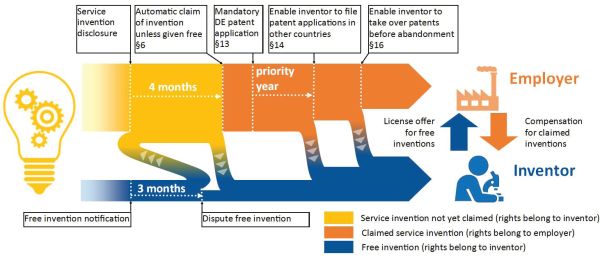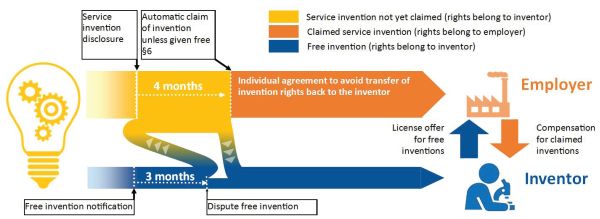Companies with Research and Development departments in Germany need to be aware of the regulations of the German Act on Employee Inventions, Gesetz über Arbeitnehmererfindungen" (ArbEG), which regulate the rights and obligations of employees and employers with respect to inventions made by employees in Germany.
Inactivity on the part of the company or lack of correct invention disclosure procedures may lead to severe consequences for the company even to the point where a company could have to transfer its IP-rights back to the employee-inventor.
Here we give a quick overview of the procedure under which the right to the invention can transfer from the employee inventor to his employer company. We further outline potential pitfalls for employers and ways to avoid them.
Transfer of rights to the invention according standard regulations

Service inventions and free inventions
In general, the rights to any invention belong to the inventor.
Service inventions, "Diensterfindungen", are inventions made by an employee during the term of employment and based on either (i) the work activity of the employee or (ii) the technical background and activity of the employer. As we will explore in greater detail below, the employer has a right to claim such inventions and absent any waiver, will generally be deemed to have done so.
All other inventions are free inventions, even if the employee invents something at home in their own time. The employee must notify the employer in writing of a free invention.
The employer may have a right to a licence under reasonable conditions. After the notification of a free invention, there is a three month term during which the employer can dispute that the invention is free. After this three month term, the invention can no longer be claimed as a service invention.
General procedure for service inventions
- The inventor is required to notify
his employer of his service invention without delay. The written
invention disclosure should describe the technical problem and its
solution as well as how the invention was made (§5 (1) and (2)
ArbEG).
- If the invention disclosure is incomplete, the employer has a period of 2 months to request amendments from the inventor. If this is not done within the deadline, the invention disclosure is deemed to be in proper form (§5 (3) ArbEG).
- The employer can actively claim the invention. For inventions notified after 1st October 2009, the invention is considered to be claimed by the employer unless the employer has explicitly waived his claim to the invention in writing within 4 months. By claiming the service invention, the rights to the invention are transferred to the employer (§6 ArbEG).
- When the employer claims the invention, the inventor is entitled to reasonable compensation from the employer (§9 ArbEG).
| Free inventions
VS. service inventions For example, an R&D manager in a paper mill may develop an improved bleaching agent for paper production. This is a service invention. The same person may invent a device for improving the flavour of filter coffee at home. This is a free invention. The free invention still needs to be reported to the employer, to offer them the opportunity to dispute that the invention is indeed a free invention. In the instance that the improvement of the coffee flavour is in any way related to treating the paper filter in the coffeemaker, then the invention made at home may still be considered a service invention, if the inventor has made use of the knowledge acquired or the materials used in the course of his employment as an R&D manager. Alternatively, consider the case where a car manufacturer has two employees, an engineer employed to develop braking systems and a dishwasher employed in the cafeteria. If the engineer invents a braking system, this is an invention based on the employee's work activity and therefore a service invention. If the dishwasher invents an improved steering wheel at home in his own time, the invention relates to the technical background and activity of the employer (building cars), and is also a service invention. Finally, if the engineer invents a new garden tool at home in his own time, this is neither based on the work activity of the engineer nor the technical background or activity of the employer and is therefore a free invention. |
- The employer has a duty to file a
patent application (or utility model) valid for Germany without
delay (§13 ArbEG).
- It is alternatively possible to treat the invention as a trade secret. In that case, with regard to inventor compensation, the employer has to treat the invention as if a patent had been granted (§17 ArbEG).
- The employer is required to enable the inventor to file IP rights in other countries, in which the employer himself does not intend to file IP rights (§14 ArbEG).
- If the employer intends to give up existing IP rights in any country, he must inform the inventor and offer transfer of the IP rights to the inventor (§16 ArbEG).
The rights and obligations under this act cannot be ceded in general, so you can't for example have a blanket clause in the contract of employment by which the employee gives up the right to compensation or ownership. However, it is possible to make individual agreements for each invention after its disclosure (§22 ArbEG).
Potential pitfalls
Inactivity of the employer or lack of correct invention disclosure procedures might lead to severe negative consequences for the employer:
Inventions notified prior to 1st October 2009 and which were not explicitly claimed in written form within a 4 month period after the invention disclosure (deemed to have taken place at the latest with the filing of an IP right) did not get automatically claimed by the employer and in the absence of an express claim, ownership may not have passed to the employer. Inventors might therefore assert a claim and demand the transfer of the IP rights from the employer. Inventions notified after 1st October 2009 are deemed to be claimed by the employer after a 4 month period, therefore requiring the filing of IP rights and payment of compensation to the inventor. If IP rights are not filed in due time, the inventor may be entitled to compensation for damages.
If the employee considers the invention to be a free invention and notifies the employer accordingly, the employer has to dispute this within a three month term, or the invention can no longer be claimed as a service invention. Inactivity on the part of the employer means that the right to an invention remains with the inventor and the inventor might therefore demand the transfer of the IP rights from the employer.
If the employer does not offer the inventor the option for foreign IP rights within the priority year or abandons IP rights without offering their transfer to the inventor, the inventor is entitled to compensation for damages, which may be considerably higher than the reasonable inventor compensation provided for by §9 ArbEG.
Company policy regarding German employee inventions
To avoid the above pitfalls and to avoid conflict with employee inventors, specific company policies regarding German employee inventors should be established. In order to clearly define the transfer of rights from the inventor to the employer and to gather all necessary information for the calculation of inventor compensation at an early time it is useful to establish a well defined system for the submission of invention disclosures:
- Making inventors aware of their duty to disclose service inventions in writing to establish a date of the invention disclosure;
- Providing information or predefined forms for the invention disclosure to help inventors in submitting a complete invention disclosure which not only defines the technical aspects of an invention, but also includes information on how the invention was made, for use in the future calculation of the inventor compensation.
In order to give companies more freedom in their decisions on IP strategy and to reduce administrative effort, individual agreements can be made with inventors after each invention disclosure in order to buy off certain rights of the inventor, in particular:
- the duty to file IP rights in Germany (§13 ArbEG);
- the duty to allow the inventor to file IP rights in other countries (§14 ArbEG);
- the duty offer the transfer of IP rights to the inventor before abandonment (§16 ArbEG).
These agreements can be integrated in incentive programs to encourage employees to make more inventions.
| Inventor
Compensation The inventor is entitled to a reasonable compensation for the use of the invention by the employer. There are detailed guidelines for determining reasonable compensation. As a rule of thumb, the compensation is based on the value of the invention, e.g. a commonly used license rate for the use of the invention, which is multiplied by a contribution factor (between 2% and 100%). This depends on the circumstances under which the invention was made, such as the number of inventors and the position and tasks of the inventor in the company. The contribution factor often lies in the range of 10% to 20%. However, individual agreements can be made with the inventor individually for each reported invention, provided they are not considerably unfair in relation to the compensation as set out in the guidelines. |
Enhanced freedom in IP decision making due to modified transfer of rights to the invention

Conclusion
The subject of handling employee inventions in Germany and devising a company strategy in this area can be complex and cumbersome. Haseltine Lake LLP is able to support you in any aspect of this topic, be it for answering specific queries, or for handling strategic aspects of employee inventions and company policy related to them.
The content of this article is intended to provide a general guide to the subject matter. Specialist advice should be sought about your specific circumstances.

